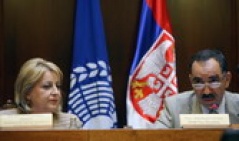National Assembly of the Republic of Serbia / Activities / Activity details

Saturday, 26 June 2010
Fifth Meeting of PAM Standing Committees Held
The National Assembly of the Republic of Serbia hosted the Fifth Meeting of the Parliamentary Assembly of the Mediterranean (PAM), from 24 to 27 June 2010.At the beginning of the first workday the participants were greeted by PAM Vice-President Abdelkader Fedala whose opening address focused on the results of PAM’s work so far.
The National Assembly of the
At the beginning of the first workday the participants were greeted by PAM Vice-President Abdelkader Fedala whose opening address focused on the results of PAM’s work so far. Fedala hoped that, after the
The Speaker of the National Assembly of the
The Fifth Meeting of PAM focused on various common problems in the region and dealt with such subjects as fighting terrorism, human trafficking, disposal of toxic waste in the Mediterranean region, global economic crisis and energy production, environmental problems, internally displaced persons, gender equality, as well as issues of inter-cultural and inter-religious relations among the people in the region.
In the work of the First Standing Committee, charged with political cooperation and security, the participants considered the question of international terrorism, basic causes and emergence, as well as potential ways to combat and prevent terrorism. The working part of the meeting gave rise to a debate on the problems of increased human trafficking, as well as disposal of toxic matters in the
The work of the Second Standing Committee, charged with cooperation in the spheres of economy, society and environment, commenced with a minute’s silence to honour the civilian victims of natural disasters. In his address, Nebojsa Pokimica, Assistant Minister of Environment and Spatial Planning, listed positive examples of departmental cooperation stressing that future cooperation lies within the concept of green economy. In the meeting, the officials discussed possible solutions to the environmental problems faced by the Mediterranean region, availability of energy resources, sea pollution, conservation of natural resources, and presented the sustainable development potential of the
The Third Standing Committee, charged with dialogue among civilisations and human rights, held a meeting on the second day, to discuss refugees and internally displaced persons, Palestinian refugee women, as well as raising gender equality. Vladimir Cucic, Commissioner for Refugees of the Republic of Serbia, informed the participants that records list about 86 000 refugees and 210 000 internally displaced persons currently living in Serbia, while 100 000 to 150 000 people would be returned from 29 European countries on grounds of readmission in the upcoming period. Cucic also informed the participants that, according to UNHCR, the
The head of the
In the meeting, a special task group for inter-cultural and inter-religious dialogue discussed the Inter-cultural and inter-religious dialogue in the Western Balkans as a platform to strengthen and reinforce peaceful and good-neighbourly relations among the people in the area. In the last couple of years, a special Western Balkans group was formed aimed at discovering ways and organise incentives for a peaceful life and development of good-neighbourly relations in the Western Balkans, as well as further the promotion of respect among the nations in the Mediterranean region. In the discussion, the delegates emphasised dialogue as the only way to peace and reconciliation because people have to live together. Signing the Letter of taking responsibility, PAM members states committed to implement ideas on the improvement of dialogue.
The agenda for the Fifth Meeting of PAM also contained economic and commercial issues. During the two-day session, PAM delegates also adopted a series of draft reports and resolutions, because the
-
12.15 - MPs and the members of the Culture and Information Committee meet with the MP of the Belarusian National Assembly Upper House and head of the Direction of the International Art Festival “Slavianski Bazaar” (National Assembly House, 13 Nikola Pasic Square, hall 3)
-
13.00 - press conference of MP Marinika Tepic (National Assembly House, 13 Nikola Pasic Square, Central Hall)
-
13.00 - sitting of the Committee on the Diaspora and Serbs in the Region (National Assembly House, 13 Nikola Pasic Square, hall 2)

